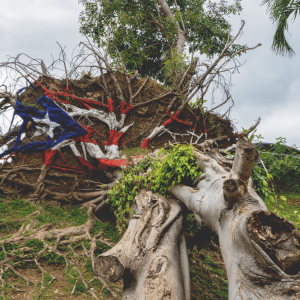Alexandra Rosado-Román is a Ph.D. candidate in ethics and society at Vanderbilt University.
Posts By This Author
What Hurricane María Revealed
The massive natural disaster showed how colonialism still ravages Puerto Rico.
IT IS INTERESTING, yet not surprising, what the political status of Puerto Rico in the wake of Hurricane María reveals about colonialism, the coloniality of power and gender, emergency government response, and civilian resilience.
Hurricane María was the worst natural disaster Puerto Rico has ever faced and the 10th-most-intense Atlantic storm on record. But Puerto Rico has experienced more than 500 years of colonial activity between the Spanish and North American empires. In addition, because much of Puerto Rico’s religion came to the island through colonization and violence, many Puerto Ricans today still struggle to trust religion and may not see religious organizations as options for help in times of adversity.
My experience in post-María Puerto Rico has made me aware of the still-present legacy of the struggle against white supremacy, racism, heteronormativity, and sexism on the island. As an Afro-Puerto Rican feminist and Christian, I am aware of the ideological and religious struggles inherent in negotiating the nature of our citizenship with the oppressive political dynamics that are exacerbated by a massive natural disaster.
Hurricane María—and its sustained winds of 160 miles per hour—blew the neoliberal veil from the colonizers’ face. The limited response from the federal government in Washington, D.C., along with our unstructured colonial system, increased already-high poverty levels from 44 to 52 percent, according to the University of Puerto Rico, and swelled the numbers of people who left the island looking for better living conditions and a brighter future. After the hurricane, Puerto Rico’s status as an unincorporated U.S. territory blocked aid from several other countries, because the 1920 Jones Act only allows entrance to the island by U.S. ships.
Despite all this, the Puerto Rican people have demonstrated their resilience and capacity to overcome adversity. Citizen mutual aid, in partnership with nonprofit organizations and local churches, proved to be one of the most crucial and immediate forms of assistance after the hurricane.
